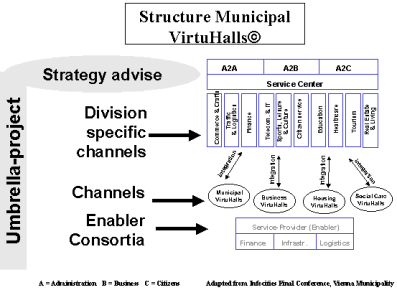
- The characteristics of the Digital Town Hall application make the processing of a business plan somewhat complex. It includes public and civic services produced in a new Information Society ways [...]. In many aspects of deployment there are differences, very much caused by the fact that the legislation and regulation concerning public services is different. In some countries it is written in law that certain services are to be provided by the municipalities and they are free of charge for the citizens. The service costs are covered by taxes. In other sites the municipal taxation rate is much lower and the public service provision and its funding has been regulated in different way. There is no common European legislation on this field - each country has traditions based on their own history and value structure, which affect this service provision structure very much. (p. 9)
The following information has been gathered in an Interoperability Report (restricted), which was one of the deliverables of the VirtuHalls© project. Since that report was not created on the basis of the latest versions of the portals, we deviate from the report when describing the technology used.
"Informed Official"
The Informed Official typically concerns information and communication facilities for civil servants. In most cases also citizens are included in the applications (open access to governmental information). Pupils in schools are in 50% of the cases targeted. Because SMEs in all cities have to deal with all kinds of regulations, it is practical to give them access to "Informed Official" applications. 50% Of the applications therefore do that.Access to the information is at least via telephone modem and ISDN. In half the cases also through kiosks in governmental buildings. Interesting to see is that "Informed Official" applications mostly are fully functional on open (Web) sites, with no specific access criteria. The information is free. Informed Official applications usually run on Intranets. Because of the inhouse character the technology is of high standard. Read the evidence reports for more about the technology we deployed.
There are recurring tasks, but it is uncertain if they could be automated by intelligent agents. User-feedback can be acquired. Interesting is that user-profiling is an option.
The trans-european consulting of information across cities is possible. The "Informed Official" can be migrated and instanced in another City and used through several access cases. No ancillary providers are foreseen, besides the current providers.
"Informed Citizen"
The Informed Citizen typically concerns information and communication facilities for citizens. In most cases, except for teachers, the full range of potential users (civil servants, pupils of schools, SMEs, medium and large-sized enterprises, and cultural organisations) is included in the applications.Access to the information is at least via telephone modem and ISDN. In more than half the cases also through kiosks. "Informed Citizen" applications are fully functional on open (Web) sites, with no specific access criteria. The information is free. A perfect example of hi-tech database driven "Informed Citizen" is Residentie.Net. Check it out. Read the evidence reports for more about the technology we deployed.
There are no recurring tasks. User-feedback can be acquired. User-profiling is an option.
The trans-european consulting of information across cities is possible. The "Informed Citizen" can be migrated and instanced in another City and used through several access cases. No ancillary providers are foreseen, besides the current providers.
"Interactive Citizen"
The Interactive Citizen typically concerns information and communication facilities for citizens. Interesting is that transaction is only the case in less than half the cases. In most cases, except for teachers and cultural organisations, the full range of potential users (civil servants, pupils of schools, SMEs, medium and large-sized enterprises) is included in the applications.Access to the information is at least via telephone modem and ISDN. In more than half the cases also through kiosks. "Interactive Citizen" applications are fully functional on open (Web) sites, with no specific access criteria. The information is free. Hi-tech applications are online to allow citizen interaction. Check it out. Read the evidence reports for more about the technology we deployed.
There are recurring tasks, but it is uncertain if they could be automated by intelligent agents. User-feedback can be acquired. User-profiling is an option, which is logical since returning interactive citizens would like the comfort of being recognised by the system.
The trans-european consulting of information across cities is possible. The "Interactive Citizen" can be migrated and instanced in another City and used through several access cases. No ancillary providers are foreseen, besides the current providers.
